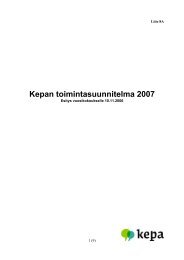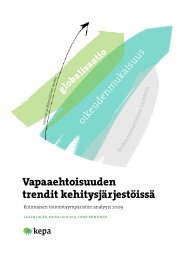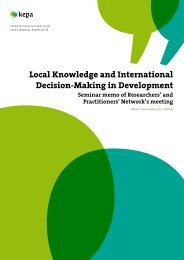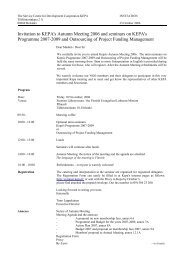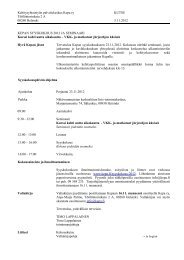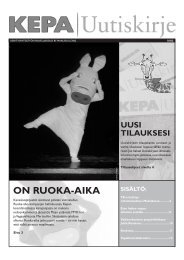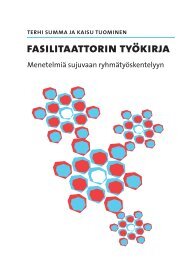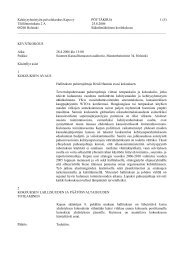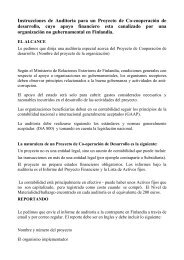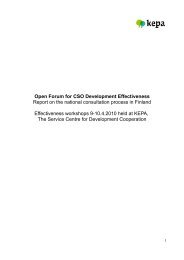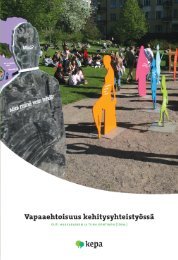La sociedad civil organizada en Nicaragua, composición y ... - Kepa.fi
La sociedad civil organizada en Nicaragua, composición y ... - Kepa.fi
La sociedad civil organizada en Nicaragua, composición y ... - Kepa.fi
You also want an ePaper? Increase the reach of your titles
YUMPU automatically turns print PDFs into web optimized ePapers that Google loves.
the interim docum<strong>en</strong>t was already in Washington.<br />
Wh<strong>en</strong> the Coordinadora demanded the<br />
docum<strong>en</strong>t, they said it was be<strong>en</strong> translated to<br />
Spanish, since it was writt<strong>en</strong> in English. It took<br />
the governm<strong>en</strong>t three months to <strong>fi</strong>nally make it<br />
public in <strong>Nicaragua</strong>.<br />
At that time, following the pressure promoted<br />
by the Coordinadora Civil and the international<br />
community, a joint effort from the governm<strong>en</strong>t,<br />
CONPES and some of the donors to de<strong>fi</strong>ne<br />
a methodology and a procedure to pres<strong>en</strong>t the<br />
PRSP and to consult the organizations and local<br />
governm<strong>en</strong>ts in the departm<strong>en</strong>ts started. It concluded<br />
with an agreem<strong>en</strong>t to carry on what was<br />
called PROCONSULTA (Project of Consultation) to<br />
be started in the following months.<br />
At the Board of the World Bank, the Interim<br />
Docum<strong>en</strong>t was approved with a few comm<strong>en</strong>ts<br />
and a lot of support saying that it was very good<br />
and it didn’t need changes. The original plan after<br />
that was that the Final Docum<strong>en</strong>t would be<br />
approved in March 2001 without further consultation.<br />
The Civil Coordination started its own evaluation<br />
and to organize its consultation process. At<br />
the same time, the CC communicated with some<br />
international NGO´s and donors to let them<br />
know their concerns related to the PRSP process.<br />
Simultaneously, the local governm<strong>en</strong>ts and organizations<br />
of the León Norte area that includes 5<br />
municipalities carried on a local discussion process<br />
to established what were the needs id<strong>en</strong>ti<strong>fi</strong>ed<br />
by the population.<br />
Finally in January 2001, several organizations<br />
s<strong>en</strong>t a letter to the Boards of the World Bank,<br />
the Interamerican Developm<strong>en</strong>t Bank, the IMF,<br />
the G 6 in <strong>Nicaragua</strong> (Swed<strong>en</strong>, Germany, Spain,<br />
Canada, United States and Japan) stating that the<br />
docum<strong>en</strong>t that was going to be approved did not<br />
have the cons<strong>en</strong>t from local governm<strong>en</strong>ts and social<br />
organizations.<br />
As a result of this letter, the approval was<br />
delayed and the <strong>Nicaragua</strong>n governm<strong>en</strong>t was<br />
forced to start a process of consultation in several<br />
of the departm<strong>en</strong>ts of the country. The Coordinadora<br />
Civil had already started its own process<br />
that included forums in all the regions and departm<strong>en</strong>ts<br />
of the country as well as with specialist<br />
in each of the main pillars of the Strategy.<br />
The results of this process were pres<strong>en</strong>ted<br />
to the governm<strong>en</strong>t in May 2001 and the of<strong>fi</strong>cials<br />
promised to incorporate the main issues. They<br />
<strong>fi</strong>nished their process at the <strong>en</strong>d of May and they<br />
included focus groups with so called ”poor people”.<br />
<strong>La</strong>ter that year, there was a joint pres<strong>en</strong>tation<br />
of the three consultation process developed:<br />
the Coordinadora Civil´s, the national governm<strong>en</strong>t’s<br />
and Leon Norte´s. Some of the proposals<br />
and concerns were very similar. The governm<strong>en</strong>t<br />
accepted to form a joint commission to id<strong>en</strong>tify<br />
the common concerns and proposals.<br />
Nonetheless, later that year governm<strong>en</strong>t of<strong>fi</strong>cials<br />
in a National Forum on PRSP accepted that<br />
they did not incorporated any of the results of<br />
the consultation processes, not ev<strong>en</strong> their own.<br />
They said that there was no time to do it and that<br />
the PRSP was an alive docum<strong>en</strong>t, that the important<br />
part would be wh<strong>en</strong> they would make the<br />
decisions about the implem<strong>en</strong>tation.<br />
Some of the main concerns expressed during<br />
the consultations where:<br />
•<br />
•<br />
•<br />
•<br />
•<br />
•<br />
•<br />
•<br />
The weakness of the Economic growth pillar<br />
The emphasis in asist<strong>en</strong>cialism<br />
The incoher<strong>en</strong>ce betwe<strong>en</strong> the text of the docum<strong>en</strong>t<br />
and the list of programs and projects<br />
to be developed, that include programs that<br />
have be<strong>en</strong> in place for up to eight years as the<br />
Reform of the Health Sector supported by the<br />
World Bank that has not be<strong>en</strong> evaluated to<br />
see if it really addresses poverty issues or it is<br />
just more privatization and further <strong>en</strong>debtm<strong>en</strong>t.<br />
The emphasis on infrastructure versus investm<strong>en</strong>t<br />
and support to the producers.<br />
The ridiculous support to small and medium<br />
producers that has a single project of $2 million<br />
dollars for <strong>fi</strong>ve years out of the $1,400 that<br />
totaled the PRSP, wh<strong>en</strong> everybody - including<br />
the PRSP docum<strong>en</strong>t - accepts that that they<br />
are the <strong>en</strong>gine of the national economy.<br />
The complete abs<strong>en</strong>ce of the transversal axis<br />
like dec<strong>en</strong>tralization, g<strong>en</strong>der perspective and<br />
<strong>en</strong>vironm<strong>en</strong>t.<br />
The lack of clear mechanisms of monitoring<br />
and evaluation of the strategy.<br />
The implem<strong>en</strong>tation of the projects exclusively<br />
by the c<strong>en</strong>tral governm<strong>en</strong>t, with out<br />
taking into account the municipalities or the<br />
social organizations.<br />
The Coordinadora Civil prior to the <strong>fi</strong>nal approval<br />
by the Board of the Bank expressed these<br />
concerns to the World Bank. In the letter of response<br />
from Donna Dowsett-Coizolo, responsible<br />
for C<strong>en</strong>tral America in the WB, she declared<br />
that they shared most of our concerns and that<br />
29




